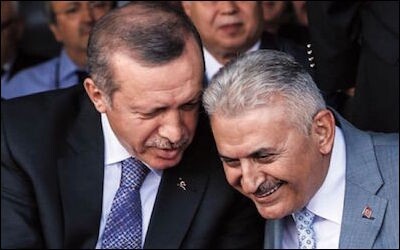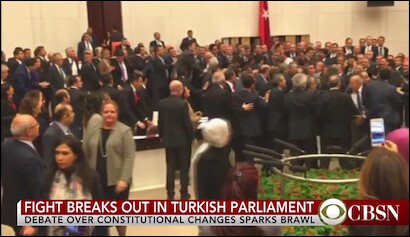In Binali Yildirim (right), Turkish President Recep Tayyip Erdogan has found a prime minister enthusiastic about an all-powerful presidency. |
Turkish President Recep Tayyip Erdogan’s one-man show goes on; he may soon progress from effectively having absolute authority to actually having absolute authority. He would apparently like to put an official seal on his increasingly autocratic regime. If a simple majority of Turks vote “yes” in a national referendum on proposed constitutional amendments in April, Erdogan will effectively consolidate the power of three legislative bodies into one powerful executive office: himself. He would then be installed as a leader with virtually unlimited authority.
Although the current constitution grants him largely symbolic powers, Erdogan has acted as the effective head of the executive branch since he became Turkey’s first elected president in August 2014. He has explicitly -- and, it appears, happily -- violated the constitution by acting as an absolute head of government. In May 2016, he forced Ahmet Davutoglu, his own confidant and prime minister, out of office; Erdogan evidently suspected that the man was not working hard enough to push for the absolute executive presidential system Erdogan has evidently been craving. Only seven months earlier, Davutoglu had won a parliamentary election with 49.5% of the national vote.
Erdogan replaced Davutoglu with Binali Yildirim, who has proven to be more enthusiastic about terminating the prime minister’s office and transferring all powers to an all-powerful president. As Erdogan’s (and Yildirim’s) ruling Justice and Development Party (AKP) lacked the parliamentary majority to put any constitutional amendment to public vote, the proposed changes therefore required support from the opposition benches. (A minimum of 330 votes is required in the country’s 550-member assembly, as opposed to 317 seats controlled by the AKP.)
The changes will make Erdogan simultaneously head of government, head of state, and head of the ruling party.
A year ago, that would have looked unimaginable. But a nationalist opposition party, the Nationalist Movement Party (MHP), made a U-turn from its public pledges of “never letting Erdogan become the executive president,” and decided to support the reform bill. Political observers are still trying to figure out what may have pushed the MHP from one extreme to the other; there is not yet a clear explanation.
Erdogan’s “Turkish-style presidency” is already a presidency with too much power held by one man. If approved in the referendum, the changes will make Erdogan head of government, head of state and head of the ruling party -- all at the same time. Erdogan would have the power to appoint cabinet ministers without requiring a confidence vote from parliament, propose budgets and appoint more than half the members of the nation’s highest judicial body. He would also have the power to dissolve parliament, impose states of emergency and issue decrees.
Alarmingly, the proposed system lacks the safety mechanisms of checks and balances that exist in other countries such as the United States. It would transfer powers traditionally held by parliament to the presidency, thereby rendering the parliament merely a ceremonial, advisory body.
Several brawls recently broke out in Turkey’s parliament during debate on a bill for constitutional amendments. |
With support from MHP, the reform bill passed in parliament with 339 votes in favor -- nine more than required to put it to a national vote.
The way the Turkish parliament debated the bill looked like a prelude to the way Erdogan’s totally autocratic presidency will fuel tensions in the months ahead. Several rounds of fist-fighting broke out. Brawls were daily scenes in parliamentary sessions. Screaming matches and physical altercations sent lawmakers to hospitals.
In one instance, an independent female lawmaker handcuffed herself to the microphone on the lectern for an hour to protest the presidential bill. Deputies from the government benches tried to remove her, but opposition deputies sprang to her defense while punches and kicks were exchanged. The assembly saw its first-ever brawl between female lawmakers, who punched one another and pulled one another’s hair. One female opposition deputy was thrown to the floor and her prosthetic artificial arm knocked off, injuring her severely.
The proposed system makes parliament a largely ceremonial, advisory body.
Nevertheless, Erdogan is happy. He will soon launch his “yes” campaign together with the nationalists in the opposition (MHP). He is confident that he will win -- he has not lost a single election or referendum since he came to power in November 2002. Observers expect that a clear majority of his party loyalists (around 40% of 50%) will vote “yes” in addition to around half of the nationalists in opposition (around 6% of 12%). That makes a combined 46% of the vote. Some of the splinter Islamist parties and non-AKP voters who favor a presidential system, too, are expected to vote “yes,” lifting the pro-Erdogan vote to a range of 50% to 55%. There is a sizeable group of “undecided” whose preferences may be influenced by Erdogan’s huge propaganda machinery or by the argument that a strong president would strengthen Turkey as it confronts a broad array of internal and external security threats.
The opposition (Kurds and secular and liberal Turks), on the other hand, looks fragmented and helpless in telling the masses that reforms would concentrate excessive powers in the hands of a leader who has increasingly displayed authoritarian tendencies. There are concerns that the opposition, under the state of emergency Erdogan’s government declared in 2016, may find it too difficult effectively and freely to campaign against the proposed amendments.
Even in the unlikely event of a win for the “no” campaign it will not be the end of the world for Erdogan. He would be bruised, perhaps badly. But he would play another card: a snap election. He would win new parliamentary elections and push for similar amendments, once again trying his chances. He would have nothing to lose. He appears to rely on popular support keeping him afloat.
From a policy-making point of view, however, a “yes” or a “no” vote will not fundamentally change the dynamics under which Turkey is being ruled. At the moment, Erdogan is effectively the absolute ruler. If he wins the vote, he becomes actually the absolute ruler. If he loses, he remains effectively the absolute ruler until he tries again to become the absolute ruler.
Burak Bekdil is an Ankara-based political analyst and a fellow at the Middle East Forum.








